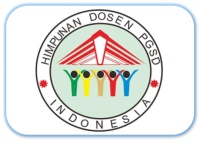Implementasi Model Problem Based Learning Untuk Meningkatkan Proses Pembelajaran Tematik Terpadu Dikelas V SD
Abstract
This study aims to describe the increase of the learning process by using the Problem Based Learning model on integrated thematic learning. This type of research is classroom action research using qualitative and quantitative approaches. The study was conducted at SDN 22 Ujung Gurun Padang city. The results of the study aimed: (1) The evaluation of learning plans in cycle I was 79.16% (good) then increased to 97.2% (very good) in cycle II. (2) Observations on the aspect of teacher cycle I with a percentage of 81.24% (good) increased in cycle II to 95.83% (very good). (3) Aspects of cycle I students with a percentage of 81.24% (good) increased in cycle II to 95.83% (very good). It can be concluded that the problem based learning model can improve the integrated thematic learning process in elementary schools.
Keywords
Full Text:
PDFReferences
Faisal. 2014. Sukses Mengawal Kurikulum 2013 di SD (Teori dan Aplikasi). Yogyakarta: Diandra Creative
Hosnan. 2014. Pendekatan Saintifik dan Kontekstual dalam Pembelajaran Abad 21. Jakarta : Ghalia Indonesia
Jihad, Asep. 2012. Evaluasi Pembelajaran. Yogyakarta: Multi Pressindo.
Kemendikbud. 2014. Materi pelatihan implementasi kurikulum 2013 tahun 2014 SD Kelas I. Jakarta : Kementrian pendidikan dan kebudayaan.
Majid, Abdul. 2014. Pembelajaran Tematik Terpadu. Bandung: PT. Remaja Rosdakarya
Mustamilah. (2015). Peningkatan Keterampilan Proses Dan Hasil Belajar Menggunakan Model Problem Based Learning Pada Sub Tema Merawat Tubuhku Siswa Kelas 1 Sd Negeri 1 Gosono – Wonosegoro. Jurnal Scholaria. Vol. 5, No. 1, Hal, 92 -102, diakses tanggal 10 Januari 2020.
Rusman. 2013. Model-model Pembelajaran Mengembangkan Profesionalisme Guru. Jakarta: Raja Grafindo Persada
Taufik, Taufina, dkk. 2011. Mozaik Pembelajaran Inovatif. Padang: Sukabina Press
Zuryanti. 2017. Pembelajaran Berbasis Masalah Sebagai Upaya Peningkatan Literasi Sains . Jurusan PGSD FIP UNP. Hal 88. ISBN:978-602-619994-0-4. diakses tanggal 17 November 2019.
DOI: http://dx.doi.org/10.24036/e-jipsd.v10i2.10402


